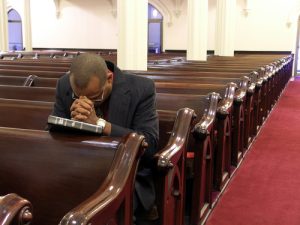Like any family, the Christian Church, whether a Catholic parish, or Non-Denominational congregation all have unique talents and gifts within the individuals who participate in the life of the church. Whether these gifts are spiritual, or financial, or in organization, they all bring special aspects to properly function from both material and spiritual parts. Since the dawn of Pentecost, the Apostles set forth and founded Christian communities and Churches throughout the Roman Empire. The apostles organized these small Christian churches with guidelines and blue prints to function both physically and spiritually. In the spiritual sense, the Church collectively was seen as the Body of Christ, Christ the head and all baptized believers various members of the body with different functions. Ecclesiastically, the presbyters and deacons played a key role in local communities, answering to apostles and disciples who founded the various churches. These communities were diverse depending on their location within the Roman Empire but all shared one common faith.

Like today, those communities came together to celebrate the Eucharist, share Christian values and spread the word of Christ. Yet also like today, they shared in their own local issues. They too had to get along with each other and many differences did arise. For instance, the issue of circumcision for non-Jewish converts was a hotly debated church issue that divided even Peter and Paul. Yet, all these issues were usually resolved with Christian charity despite grave differences of opinion.
Please also review AIHCP’s Christian Counseling Courses
Divisions and Conflicts
Today, many churches have missions and goals and ideas how to best serve Christ, but within the local church exists numerous opinions that sometimes come at odds with one another. This can lead to un-Christian behaviors and sometimes division within the Church. It can lead to resentment, frustration, isolation and division between members. In some ways the local church can become a club where others wish to be heard or seen more than others or push their agendas above others. In fact, many “religious” individuals may be very well superficial in faith and look more for human favor among the members that serves their own egos rather than serving Christ. Others may have an agenda and that agenda while good may consume them and when rejected by others become a personal slight. Hence the church while serving a spiritual goal and agenda can and does become a political and social club many times. Some may wish simply to show up Sunday and be done with the church politics, while others may find church social life rewarding, but it is important to treat the church not as a social club or a place to be seen but instead as a supernatural unit dedicated to spreading the Gospel. Sometimes financial discussions and social discussions are needed and can raise temperatures of individuals in debate on how funds should be allocated, but ultimately, the primary goal and mission statement of any church is to spread the Gospel and when that spirituality is lost, then the church might as well become a social hall than a spiritual organism.
On a larger scale, other issues may also look to divide the faithful. Politics can be a very divisive tool used by Satan. Only moral issues in the public sphere should be discussed within the Church, such as abortion or marriage laws. Support of a particular candidate or shunning others of a different political thought or party has no place within the Church. Christ clearly divided Caesar and God and so does the United States constitution. The Church as a tax exempt organization should never show support for any party or politician nor dismiss others who disagree with the majority. Politics has no place in any church and can be a poison to the unity and spirituality of the Church.
In addition, theological issues can divide the faithful. Issues of a woman’s role in the Church, homosexual marriage and rights, and other theological issues and differences on interpretation of Scripture can divide members. It is important to maintain the creed of Christ, the Bible and dogma of the Church, but there is also in some cases wiggle room for more conservative and liberal members to give and take on current church law or human made institutions. What is most dangerous is when one openly rejects a tenet of the faith or when one becomes so self righteous as to condemn others. The pastor or priest must play the role of mediator and teacher in these instances
Even within spiritual discussions human ego can emerge. Arguments over liturgical music, or how a ceremony should be organized or what date can all play roles for more church politics. In essence, everyone sometimes wants to be heard, seen, or approved. When these things do not occur, then the inner arguing and jealousies can emerge much to Satan’s delight. Unfortunately, this is human nature and will almost always occur. Pastors, ministers, priests, and leaders within the congregation all have to manage these emotions as the early apostles did. The first step always is remembering the spiritual goal and mission statement first and harboring a strong spirituality to weed out those who are there for themselves instead of God.
Because of divisions, human arguments and bad behaviors it is important to set forth guidelines for meetings. It is also crucial to set forth proper meeting agenda rules, schedules and formats to maximize time. This involves articulate communication skills, as well as organization. Those with ideas should be respected and listened to with empathy and charity. When differences arise, the commonality of Christ and the grace of the Holy Spirit should guide the conversation. Whether it is budget or liturgical music selections, every conversation in meetings should be monitored and regulated to avoid over speaking of each other and insults. Again, the Church is also a spiritual place and it should reflect the early apostles in their spirit of spreading the Gospel whether in different ways or not. This involves basic skills of communicating, listening and showing respect. Ultimately the success of these meetings or events relies heavily upon the leadership of the Christian leader.
Christian Leadership and Mission Statements and Goals of the Church
It is important to return to the goals of the church which is bring Christ to the world. Mission statements may be worded differently but each church serves a spiritual purpose to make the world a better place. The church while physical on earth is also spiritual. The Church Militant on earth serves to spread the Gospel and to share the truths of Christ through the sacramental life of the Eucharist. When these goals and mission statements are lost, then the church can become more temporally orientated. This is not to say festivals, or fund raisers or social picnics are not wonderful things to bring the community together, collect funds for the church and poor, as well as pay the bills to keep the lights on, but it when these things become so much that they cloud the goal and mission statements of the church, then the spirituality of the faith can be damaged. This is where more secular minded members thrive with festivals and games and fund raisers. Some may be good financial advisors and serve the church economically well but others may only see this social status.

What gets lost in this? Food drives, collections for the poor, counseling services, marriage and divorce support, spiritual events, prayer groups, and other ministry based projects. How many more are concerned with the social outings than the spiritual meetings of prayer? A parish or local church’s spiritual life is correlated with its spiritual practices. Within Catholic parishes, are groups more concerned about Bingo or the festival, or more so about Eucharistic adoration, prayer, or food drives? Does the Church pride itself on the size of its festival and how much collected each week, or on its outreach programs to the local poor as well as services to guide the youth, troubled, grieving and promotion of theological education?
Christianity is not just a singular religion but a social one. It involves interaction and giving back to the Body of Christ. Even the most spiritual saints understood they could not escape the cry of the Christian population. Those close to Christ always find themselves returning to the people and finding Christ in them as well. Hence those in Christian leadership are critical to controlling the secular impulses of the congregation as well as regulating emotional outbursts and petty jealousies. While one would assume Christians would already adhere to a particular ethical rule of business as treating each other as Christ, this is hardly the reality. So sometimes it involves laying forth a set of rules and ways Christian people conduct church or parish meetings. This involves starting all meetings with prayers and blessings that look to dismiss hubris, to focus on the necessary temporal but understand the greater importance of the spiritual goals and missions of the church. It involves carving out a Christ like description of meeting rules which shows mutual respect, understanding, nonjudgement and empathy to fellow parish members. It involves setting forth a way committees treat each other as well as dismissing bullying or other forms of harassment.
When leadership is lacking and events or meetings occur, it can sometimes seem like a club meeting or a job with individuals who need authority somewhere in life and finally find it in the wrong place, namely the church.
So one must turn to the early Church and apostles as examples of best leadership. A Christian leader understands his/her own limitations and finds the charisms and talents within the congregation to aid the growth of the church. The Christian leader is able to take criticism with humility, bridge diverging opinions, bring the best out of others and encourage others in Christ. A Christian leader is humble and understands the first will be last in heaven. While utilizing authority when needed, the Christian leader is gentle and compassionate in decisions. The Christian leader leads by example not commands. Like Christ, the Christian leader “washes” the feet of the “apostles”. The Christian leader embodies service, shepherding, stewardship while exhibiting humility. A Christian leader in many ways is called by Christ to lead. It is a sacred vocation accepted by the congregation.
However, within any church or parish, it is essential to respect authority. The Church has never been a true democracy within itself. There has always been a emphasis on spiritual authority. When spiritual authority is disregarded or a church leader dismissed, then there is no shepherd for the flock. Every flock needs a leader and respect to that authority is essential. Unfortunately, due to scandal and abuse, many have lost faith in leadership within Christian Churches. Only through good example and accountability can this authority again earn respect. Because of this, the Christian leader is also called to the highest standards of ethical and moral behavior. The Christian leader is not sinless, but strives to give the best example as possible. The Christian leader hence needs mutual support from other leaders. Confession, or counsel should come from other trusted mentors or fellow leaders to help one with self care, spirituality and possible times of desolation. Christian leaders continue to learn, study and focus on spirituality and discernment of the fulfillment of their calling.
Conclusion
The Church is a dynamic organism. Within Scripture, it is a living body with Christ as its head. It involves those on earth and those in heaven, who collectively work together as one body. This spiritual calling is primary but due to temporal existence the church is also a building that needs upkept. Finances emerge. Festivals and fun outings need planned. But when these things overshadow the mission statement and goal to spread Christ to the world and share and enhance each others spirituality, then the church can lose its spiritual identity.

Within the Church, like any family, there will exist divisions and arguments, but they need to be maintained in a charitable way with rules and regulations. Christian leaders are more than priests and pastors but also organizers and communicators. They not only preach and heal, but also lead and unify. It is essential despite differences in theology, meeting disagreements, or event planning that the Christian communities work together and constantly behave with Christian charity with one another. Ultimately Church is not a social club to be seen or heard or abuse authority or demean others, but a place to grow together in Christ and spread the Gospel. This involves humility, charity and prayer in all Church gatherings.
Please also review AIHCP’s Christian Counseling Certification and see if it meets your academic and professional goals. The program is online and independent study and open to qualified professionals seeking a four year certification. The program is especially beneficially for training of ministers and clergy or professionals within the church community who are looking to offer basic spiritual direction and counseling services at a non clinical level.
Additional Resources
Tenny-Brittian. “The Effective Church Group”. Access here
Neffiner, V. (2019) “Here Are 8 of the Most Controversial Issues in the Church Today”. Crosswalk. Access here
“20 ways to prevent and resolve conflict in the church” (2023). NC Baptists. Access here
Perry, T (2020). “Effective Christian Leadership for Today: Key Aspects, Stages & More”. Access here
Faulkner, B. (2024). “7 Biblical Models of Leadership”. LifeWay. Access here
